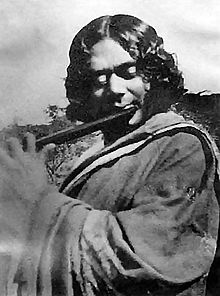Kazi Najrul Islam
Born in a Bengali Muslim Kazi family, Nazrul
Islam received religious education and as a
young man worked as a muezzin at a local
mosque. He learned about poetry, drama, and
literature while working with the rural theatrical
group Letor Dal. He joined the British Indian
Army in 1917. After serving in the British Indian
Army in the Middle East (Mesopotamian
campaign ) during World War I , Nazrul
established himself as a journalist in Calcutta .
He assailed the British Raj in India and preached
revolution through his poetic works, such as
Bidrohi (The Rebel) and Bhangar Gaan (The Song
of Destruction), as well as his publication
Dhumketu (The Comet). His nationalist activism
in Indian independence movement led to his
frequent imprisonment by the colonial British
authorities. While in prison, Nazrul wrote the
Rajbandir Jabanbandi (Deposition of a Political
Prisoner). Exploring the life and conditions of
the downtrodden masses of the Indian
subcontinent , Nazrul worked for their
emancipation. His writings greatly inspired
Bengalis of East Pakistan during the Bangladesh
Liberation War . Bangladeshi literary critic Azfar
Hussain characterized Kazi Nazrul Islam as one
of the greatest revolutionary poets in the
world. 
Nazrul wrote the
Rajbandir Jabanbandi (Deposition of a Political
Prisoner). Exploring the life and conditions of
the downtrodden masses of the Indian
subcontinent , Nazrul worked for their
emancipation.
famous poet
yes yes Nazrul wrote the
Rajbandir Jabanbandi (Deposition of a Political
Prisoner). Exploring the life and conditions of
the downtrodden masses of the Indian
subcontinent , Nazrul worked for their
emancipation.
good job man.